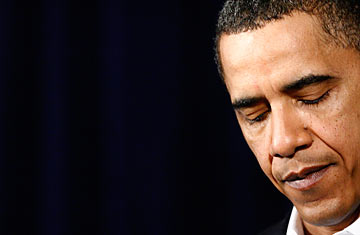
TIME's Joe Klein sat down for an interview with President Barack Obama in the Oval Office on Jan. 15, 2010.
Klein: I talked to a bunch a folks — friends, my kids — what should I ask the President? It was almost unanimous: the thing that people remarked on is just how crazy things are. How difficult it is. Focused on the health care process — what have you learned from that process, what's your takeaway? How is it going to influence the rest of your presidency?
Obama: Look, even if we hadn't tackled health care, this year was going to be a tough year. During the transition period last year, it became apparent very quickly that we were going to have to make some fast, tough and in some cases politically unpopular decisions to make sure the financial system didn't melt down and we did not spiral into a second Great Depression. We made those decisions and executed them, and I am absolutely convinced that had we not acted the way we did that the situation would've been far worse.
Having said that, we've still lost 7 million jobs over the last two years. People who are out of work or have seen their 401(k)s diminish or their hours reduced understandably are frustrated when they see big banks getting money for a problem that they helped cause. And when you see the unemployment rate spike to 10%, it was inevitable and justifiable that the political climate would become very difficult. So health care was done against the backdrop of what was already going to be a tough political climate.
Having said that, there is no doubt that the process for doing big, important things in this country has become far more difficult because of the way Congress is working right now. I came in expressing a strong spirit of bipartisanship, and what was clear was that even in the midst of crisis, there were those who made decisions based on a quick political calculus rather than on what the country needed. The classic example being me heading over to meet with the House Republican caucus to discuss the stimulus and finding out that [House minority leader John] Boehner had already released a statement saying, We're going to vote against the bill before we've even had a chance to exchange ideas.
So I understand the strategy that the Republicans decided to pursue. There is a good political argument for it. I don't think it has served the country well, and it hasn't served the process well. Health care then became caught up in that process. And I think that what's clear is that if you have an opposition party that is determined to say no [and] sees their political survival dependent on gridlock, things can get tied up in knots. So that's the second point.
And the final point is that health care was going to be hard in any environment with any Congress. There's a reason why seven Presidents and seven Congresses have failed to do it. It is a massive undertaking. It involves every special interest imaginable. The American people know that the status quo isn't working, and yet sometimes the devil you know is better than the devil you don't. So it is very easy to caricature any efforts at reform as negative.
